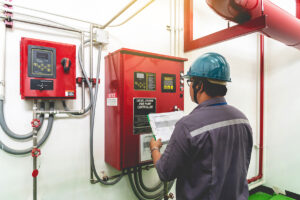
Fire pumps send water through your fire protection systems, such as fire sprinklers and hydrants.
Fire safety is a critical consideration for any commercial facility, and one of the key components of an effective fire protection system is the fire pump. Fire pumps play a crucial role in ensuring that adequate water pressure is available to suppress fires, safeguarding lives and property.
What is a Fire Pump?
A fire pump is a component of a fire protection system’s water supply that is powered by electricity, diesel, or steam. It provides high-pressure water flow to fire sprinkler systems, standpipes, and hydrants to ensure effective firefighting capabilities. Fire pumps are activated when the pressure in the fire protection system drops below a certain level, typically due to the operation of one or more fire sprinklers or the opening of a hydrant valve.
Types of Fire Pumps
There are several types of fire pumps, each with specific applications and advantages. Understanding these types can help you select the most appropriate one for your commercial facility.
Centrifugal Fire Pumps
Centrifugal fire pumps are the most common type and operate using the kinetic energy of an impeller to increase the pressure of the water. They are further categorized into:
- Horizontal Split-Case Pumps: These pumps have a horizontally split casing, making maintenance and inspection easier. They are ideal for high-flow applications and are known for their reliability and durability.
- Vertical Split-Case Pumps: These pumps have a vertically split casing and are used where horizontal space is limited. They are also reliable and durable but are more challenging to maintain compared to horizontal split-case pumps.
- Vertical Inline Pumps: These pumps are compact and take up less space. They are often used in buildings where space is at a premium. They are easier to align and install but may require more maintenance.
- Vertical Turbine Pumps: These pumps are used for deep wells or underground water sources. They are highly efficient and can pump water from considerable depths, making them ideal for facilities with such water sources.
Positive Displacement Fire Pumps
Positive displacement pumps provide a constant flow at a given speed regardless of the discharge pressure. They are less common than centrifugal pumps and are used in specific applications where precise flow rates are necessary.
- Rotary Gear Pumps: These pumps use gears to pump water and are suitable for low-flow, high-pressure applications.
- Piston Pumps: These pumps use pistons to move water and are suitable for applications requiring very high pressures.
Choosing the Right Fire Pump for Your Commercial Facility
Selecting the right fire pump for your commercial facility involves several considerations to ensure optimal performance and compliance with fire safety regulations.
Assess Water Supply and Demand
Evaluate your facility’s water supply and demand requirements. Determine the available water source (e.g., municipal water supply, water tanks, or underground wells) and calculate the required flow rate and pressure for your fire protection system.
Understand Local Codes and Standards
Ensure that the fire pump you select complies with local fire safety codes and standards, such as those set by the National Fire Protection Association (NFPA) or other relevant authorities. These standards dictate the minimum requirements for fire pump performance, installation, and maintenance.
Consider the Type of Fire Protection System
The type of fire protection system in your facility will influence the choice of fire pump. For instance, a sprinkler system may require a different pump type compared to a standpipe system. Understanding the specific needs of your fire protection system is crucial.
Evaluate Space and Installation Constraints
Consider the available space for the fire pump installation. If space is limited, a vertical inline pump or a vertical turbine pump might be more suitable. Additionally, assess the ease of maintenance and accessibility for regular inspections and repairs.
Power Supply and Reliability
Choose a fire pump with a reliable power source. Diesel-powered pumps are often preferred for their reliability in power outages, while electric pumps are suitable for facilities with a stable and uninterrupted power supply. Some facilities may also use steam-powered pumps where steam is readily available.
Cost and Maintenance Considerations
Evaluate the fire pump’s initial cost and long-term maintenance requirements. While some pumps may have a lower upfront cost, they might incur higher maintenance expenses over time. Consider the total cost of ownership when making your decision.
Fire Protection Services from Fireline
Whether you need smoke detectors, fire extinguishers, or an automatic sprinkler system installed at your commercial property, Fireline has you covered. We have been protecting people and property from fire damage since 1947—and our experience shows in our excellent work! We are known for our superb customer service, our expertise, and our reliability. For more information on how we can help your residential or commercial property, visit us online or give us a call at (800) 553-3405. We are in Baltimore, MD, with a second office in Leesburg, VA. For more fire safety tips, be sure to follow us on Facebook, Twitter, and LinkedIn.
